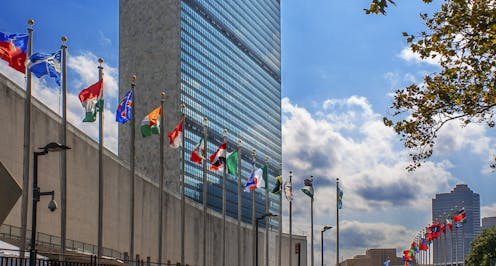Democracy spreads in waves – but shared cultural history might matter more than geography
- Written by David Welch, Senior Lecturer, University of Auckland

Recent events like the war in Ukraine, conflicts over Taiwan and the rise of authoritarian ideology have renewed interest in the foundations of modern democracy.
They have raised questions about why some nations are more democratic than others, and how democratic institutions, freedoms and values are spread or lost.
We tend to think of this variation in terms of geography – democratic Western Europe or autocratic Middle East.
But in a new analysis of 220 years of political data, we show that deep cultural connections between countries such as shared linguistic or religious ancestry matter more than geography.
Waves of democratisation
The emergence of modern democracy coincides with the rise of nation states in Europe at the beginning of the 19th century. Democracy spread across European nations and their colonies, over three waves.
The first wave lasted about a century, from 1828 to 1926, halting after the first world war. A second, rapid wave (1945-1962) followed the second world war and decolonisation.
The third wave began in 1974 and continues today. It encompassed political transitions and new countries in Europe, Latin America and the Pacific.
Each wave was followed by a period of reversals when nations turned to autocratic regimes, junta or fascism. Indeed, some researchers speculate we are heading into another period of reversal.
Read more: Is democracy really 'on the ballot' in the US midterm elections?
What drives modern democracy?
Scholars traditionally considered factors internal to a country – economic growth, rates of education or the natural environment – as the drivers of these waves. However, the geographic clustering of democracy and the wave-like pattern of expansion suggest the process may also involve a kind of contagion where democracy passes from one nation to another.
One explanation for this is that democratic change spreads across borders, so that neighbouring countries end up with similar levels of democracy.
Culture provides another explanation. Neighbouring countries tend to share a common cultural heritage, such as related languages or religions. This shapes national institutions, norms and values.
Read more: How Hitler conspiracies and other Holocaust disinformation undermine democratic institutions
In our research, we tested the idea that common cultural ancestry explains variation and change in democracy around the globe. We brought together 220 years of democracy data with information on the cultural relationships between nations. The cultural relationships we examined were based on languages and religious beliefs.
For example, Portugal is linguistically closer to Spanish-speaking Argentina and Spain than to England and Germany (which speak Germanic languages). Likewise, Myanmar, a Theravada Buddhist country, is religiously closer to Mongolia (where Vajrayana Buddhism is predominant) than to Muslim Malaysia.
Culture is more important than geography
The democracy data we studied cover 269 modern and historical nations and three widely-used democracy indicators, measuring democratic and autocratic authority in governing institutions (Polity 5), electoral participation and competition (Vanhanen Index) and individual rights and freedoms (Freedom House).
Across all three indicators of democracy, we found countries that share linguistic or religious ancestry tend to have more similar democracy scores. These shared cultural ties were better predictors of democracy than geography, especially during the third wave of democratisation.
Knowing the democratic status of a country’s linguistic or religious relatives helps predict that country’s future level of democracy five, ten or even 20 years later.
These effects were not just due to countries sharing a language (for example, the English-speaking world) or religion (such as the Sunni Islam majority countries). This suggests deeper cultural connections between countries are important.
What this means for the spread of democracy
These effects could be the result of a number of processes.
One possibility is that countries directly inherited institutions along the same pathways they inherited cultural features like language. For instance, Aotearoa New Zealand and other Commonwealth countries inherited the British legal system along with the English language.
Another possibility is that cultural similarities might make countries more likely to maintain ongoing social connections, including foreign relations, which then aid the spread of institutions. For example, the Arab Spring spread among a set of countries with common linguistic and religious heritage.
A third possibility is that inherited cultural values could steer countries towards similar institutions. For example, in previous research we found that tolerance of diversity (cosmopolitan values) promotes a shift to more democratic institutions, but the reverse is not true. Democratic institutions do not shift tolerance.
Countries that have inherited cosmopolitan values as part of their shared cultural ancestry may be more likely to shift towards democracy. If this theory is correct, it calls into question the assumption that democratic institutions can endure without sustained efforts to promote the cultural values that support them. The US interventions in Afghanistan and Iraq may be tragic examples of this.
Read more: What is the difference between a populist and a dictator? The ancient Greeks have answers
Our findings indicate cultural history matters for understanding the spread of democracy around the globe. This does not mean culture is the only factor at play (our analyses still leave a lot of variation unexplained). Neither do our findings speak to a population’s ultimate potential to achieve democratic outcomes, but we see this as within the reach of all populations.
This means those wishing to support democracy at home or abroad should take cultural barriers seriously. We cannot assume that institutions that work well in one cultural setting can be easily transplanted to another, very different setting, with different values, norms and traditions. We should pay more attention to culturally closely related countries that have succeeded at merging local norms and values with democratic institutions.
Authors: David Welch, Senior Lecturer, University of Auckland




